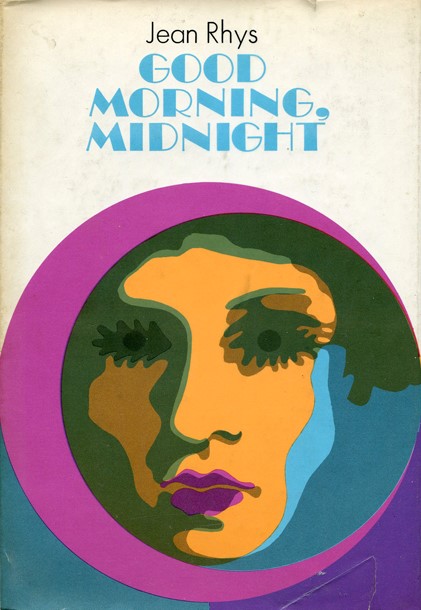176 pages, $5.55
Review by Aria Aber
The first time I read Good Morning, Midnight was during my quarantine in a single hospital bedroom immediately after a New Year’s Eve party. My exclusion from the exterior world and the corollaries of my comedown facilitated a hefty journey into the depths of this underrated, forgotten little book. I couldn’t help but think of my grandmother, who believes that humans, if seen through the clarity of simple eyes, are, at their innermost core, emotionally tied to only one of the following: sad or happy. I don’t want to encourage anyone to follow this psychologically ignorant analysis, but I do praise its applicability whenever I encounter someone who has actually read a Jean Rhys novel apart from Wide Sargasso Sea (to which they were probably forced during an academic excursion) and enjoyed it. If they did, chances are they are somehow… sad. Not 2005 self-harm-glorifying Emo sad, but melancholy. It’s obvious that unlucky, poverty-stricken, white Creole writer Jean Rhys was one of the sad ones herself. You don’t have to be born into the wrong caste or know what it feels like to have to steal your lunch at the supermarket in order to understand Rhys – but you have to be receptive to the melancholy in everything: in ‘afternoon light’, in sunrises, in dancing under confetti storms, in ice cream, and even in grandparent couples who lovingly smile at each other. But this isn’t the only reason why I can’t quit reading about a depressed alcoholic woman in her mid-50s haunting Parisian streets between the World Wars. It’s because it’s wonderfully crafted, intensely poetic and brutally relevant … even today, almost 80 years after its publication.
The semi-autobiographical novel follows the alienated Briton Sasha Jensen on her short vacation in Paris where she is forced to reevaluate and reminisce about her younger years, and as the story progresses, we find ourselves inside an eerie mirror house that reflects both the devastating and the glorious days of her past with such a lush vividness, I can feel the drops of sweat and tears and blood smearing my hands as I turn the pages. Even though Rhys manages to ignore the wars very similarly to some of her modern contemporaries, Sasha fights the consequences of an accelerating capitalistic economy in her own, delicately personal way. And within the stream of consciousness narrative, the reader breaks with Sasha more than once. Under poverty, under patriarchy, under urban cityscapes which swallow her and spit her out arbitrarily.
Whenever I walk through the nocturnal side alleys of Paris, or even London, I cannot help but hear Sasha’s voice whispering to me about the men who have done her harm. It is always fragile, taunting, moving. And it is always about men: bosses who humiliate her, strangers who court her, husbands who do both and more. You are boring in bed, they say, you do not move your body. The gentle language which Rhys deploys to elaborate on such indignities morph to chords of a literary cello that hauls a woe of rejection about shattered dreams and loves. Nonetheless, amidst all the darkness, a pale light flatters and flashes around Sasha Jensen. The self-acclaimed ‘cérébrale’ plays with her mind, mentions philosophers, nods at contemporary and classic literature, shows awareness of people of colour, and merges languages – all in order to twist her bitterness into a profoundly cynical, unsettling and deeply intelligent tale about what it means to be a woman, a foreigner, an outsider. I have never met anyone who has forgotten this book – it punches you in the face, even if it is with the frail hand of a dying person.
Everybody acknowledges Rhys as a gifted writer, but her voice is easily dismissed as resonating too much sadness. Interestingly enough, the essence of this opinion can be found in one of the first reviews written about Good Morning, Midnight, which was published in 1939: ‘well written, but too depressing.’ Rhys has this gift because of her background, because of her own depression — the gift of opening a door and luring you through her ‘deep, dark rivers’ to the margins of society, where the poor, depressed, forgotten relicts of our community breathe and beat and trot along; her words become heavy weights around your ankles which tenderly drown you, into the shadows of trauma, addiction and sadness, a sadness that is never quite subjective and thus so painful. Perhaps the reason why people neglect this story as too depressing lies in its honesty, in its very hurtful truthfulness. Because it cuts them open and leaves them stranded at the shore of their own reality a bit more like our protagonist: wounded, vulnerable and, yes, eternally sad. Rhys created what Kafka wanted a book to be — the axe which breaks the frozen sea inside of us.
***
Aria Aber lives and writes in London, where she’s an undergraduate at Goldsmiths College, UoL. Her poems and essays have appeared or are forthcoming in Wasafiri, decomP, Metazen, The Doctor T.J. Eckleburg Review and others. She was awarded the 2014 Wasafiri New Writing Prize in Poetry. In her spare time she co-edits the literary section of [smiths] and works as a poetry reader for Adroit Journal.
![[PANK]](http://pankmagazine.com/wp-content/themes/pank/assets/images/pank-logo-large.png)

